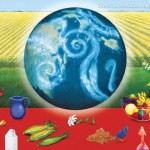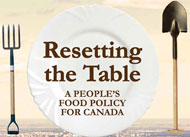A great talk on building healthier restaurants from December 2010.
A film by Deborah Koons Garcia, 2004 (Lily Films)
5 years old but still relevant.
I just saw The Future of Food (2004), a documentary film by Deborah Koons Garcia. This is a noteworthy film from the early days of GMO awareness in the United States. It explores the quiet introduction of GM (genetically modified) foods into our food system. Focusing on the story of BT corn, canola and soy, this interesting little film explores on the plight of the small family farmer vs the likes of Monsanto Inc. We meet Percy Schmeiser, of Saskatchewan, and Rodney Nelson, of North Dakota, two farmers who had the audacity of having Monsanto patented GM seeds blow onto their fields. Their stories are shocking and reveal the pervasiveness of Monsanto’s tentacled reach into the FDA, government policy and legal system.
If you haven’t seen it, definitely worth a watch
It’s spring, right? And you want to know what’s in season in Ontario now.
Veggies:
Beets, cabbage, carrots, greenhouse cucumbers, greenhouse lettuce, mushrooms, onions, parsnips*, greenhouse peppers, rutabaga, sprouts, sweet potatoes and greenhouse tomatoes.
Fruits:
Apples and rhubarb.
According to Foodland Ontario, the above foods are “scheduled” for April. But with the slow spring we have this year, it might be better to expect them to arrive closer to May. All the same, it’s almost May so keep an eye out!
*Not a parsnip fan? Try this recipe given to me by my old CSA, La ferme de Bullion, in Québec. It’s surprising how eating a good-for-you, local food prepared in a new way can make you feel like a super star.
Parsnip Pancakes
4 cups parsnip peeled and cubed
2 eggs slightly beaten
1 onion finely chopped
1 tsp salt
1 tsp oil
1/2 cup finely chopped walnuts
1 tsp dried tarragon
2 cups breadcrumbs
Steam parsnips until tender (10-15 mins). Sauté onion in oil, add tarragon.
Mash parsnips; add onion, egg, salt and nuts and mix well. Form into 12 patties.
Coat with breadcrumbs. Bake at 350F for 20 minutes.
Mmm mm.
(Ontario garlic might make a good addition too.)
Canada now has a citizen-driven food policy.
The People’s Food Policy (PFP) was unveiled this past week as a plan that addresses some of this country’s most confounding food-related inconsistencies, including why close to 2.5 million Canadians don’t have enough to eat, while one in four of us is considered obese.*
What is new here is that the PFP looks at our food system and recognizes its inter-connectedness with issues of health, hunger, climate and agriculture. Food and agri are often associated, but to include health, hunger and climate in the picture is nothing short of revolutionary for this country.
I guess that’s what happens when regular citizens get involved. The PFP consulted regular Canadians, farmers, fishers and organizations that deal with food security.
What did the inquiry find? Basically that our food system is failing us, and the status quo is not an option, says Amanda Sheedy, PFP coordinator.
Key PFP recommendations:
- Localizing the system so that food is eaten as close as possible to where it is produced.
- Supporting food providers in a widespread shift to ecological production, including programs to support new farmers getting on the land.
- Enacting federal poverty elimination and prevention programs to ensure Canadians can better afford healthy food.
- Creating a nationally-funded children and food strategy.
- Ensuring that the public, is actively involved in decisions that affect the food system.
Here, here!
The new People’s Food Policy site just launched, so take a minute to sign their pledge for a healthy, fair and ecological food system.
*<rant>
Of course, this might be due the plethora of inexpensive, nutrient-poor, food-like products that pass for food on supermarket shelves that fill us up but leave us malnourished.
</rant>
Good news, urban farmers are getting busy, despite the unspring-like weather.
Check out the Toronto Star article about Erica Lemieux from City Seed Farms and get inspired.
I had the pleasure of chatting with Erica at a Food Forward event a few months ago. She’s a local girl who was inspired by BC spin farms and decided to make things grow in Toronto backyards.
Good news is that she’ll be a speaker at Food Forward’s next Foodie drinks event, May 5 at Stella.
Please check out a wonderful post on Folks gotta eat about a new grant by the McConnell Foundation to help strengthen regional food economies.
This is inspiring stuff. We need it, and we need more of it.
Ever heard of the Doomsday Vault?
The Svalbard Global Seed Vault is located on the remote island of Spitsbergen, Norway. It’s a backup should anything happen to seeds currently being saved in traditional genebanks — a type of safety net against loss of diversity.
Sounds like a good enough idea, right? If calamity strikes, be it natural or man-made, we have something to go to, a plan B.
But as Genevieve Grossenbacher of Seeds of Survival, mentioned at the 2011 Organic Grower’s Conference, who is going to have access to those seeds in an eventual disaster?
Will you? Not likely. Nor will I.
With the free exchange of seeds now being further threatened by Canada’s Comprehensive Economic Trade Agreement with the EU (more on CETA at the National Farmers Union), it’s high time we expand our love of local food to include local seeds.
Local seeds are adapted to the local environment. They have evolved over thousands of years to grow and flourish in a specific location with specific growing conditions. Local seeds produce the best, most resilient, most nutritious local food and are the best seeds to plant -– and to save.
It’s spring. Plant your herbs and your veggies, but plan to save a few seeds from your harvest for next year. All you need is an empty clean jar.
More info on seeds and seed saving:
Seeds of Diversity
Guelph Centre for Organic Farming
Urban Harvest
If you’ve ever wondered what we talk about on the Localfoody blog, here it is in living colour.
Thanks to the folks at Wordle for the cool tool that created this image.
Walmart goes organic. This has been so in the States for a few years now and in Canada for about one year. The articles are out there, but what does it mean to the organic movement?
This was brought up at the Canadian Organic Growers conference closing panel discussion this past weekend.
You might be forgiven if your first reaction to Walmart and organic is one of cynicism. But step back for a moment and consider the following.
If the organic movement is entering the mainstream, it will reach more people, some of whom may never have eaten an organic anything before.
This could be a first step for many new eaters.
It also means more fields will be devoted to chemical-free farming, and more square kilometres of our country’s soil will be able to heal.
Will this change the organic movement? Only time will tell. It may well weaken the movement. After all, Walmart’s reputation of low-balling businesses out of business is unlikely to change. Could this then put organic farms out of business?
I say that if we want to heal out systemically ailing (and failing) food supply chain, we need to start somewhere. I’m choosing to see this as a sign of the organic movement’s success.
The new agriculture is growing ecologically, socially and financially. If organics goes mainstream, really mainstream, and therefore becomes more affordable (and attracts even more followers), then perhaps the hard(er) core grassroots folks among us could then turn our attention to the embattled fight against GMOs, which our current organic standards do not even consider.
Just a thought.

The Canadian Organic Growers conference is taking place this Saturday, February 19, 2011 at the U of T Conference Centre. I had the pleasure of attending this event last year, and wouldn’t miss it for anything this year. I am even dragging my LocalFoody colleague, François — I lie, he’s equally psyched — along for the informative, enjoyable and very tasty ride (they serve a great lunch).
This year’s keynote speaker is Canadian author Silver Donald Cameron, who will be sharing some of his insights into Bhutan’s new economic model of “Gross National Happiness”, a system that values a more holistic interpretation of “quality of life” than we might be used to and includes the organic certification of the entire nation’s agricultural system.
Nice.
Panel discussions include GMOs, heritage seeds, Walmart, bread & beer, beauty products and more.
Where: U of T Conference Centre, 89 Chestnut St.
When: Saturday 19 February 2011, 9 a.m. – 5 p.m.
Cost: $85 (Worth it, and students, retirees and the unwaged get a special rate.)
If you care about your food and want to be informed of the issues, this is a must-go-to event.




